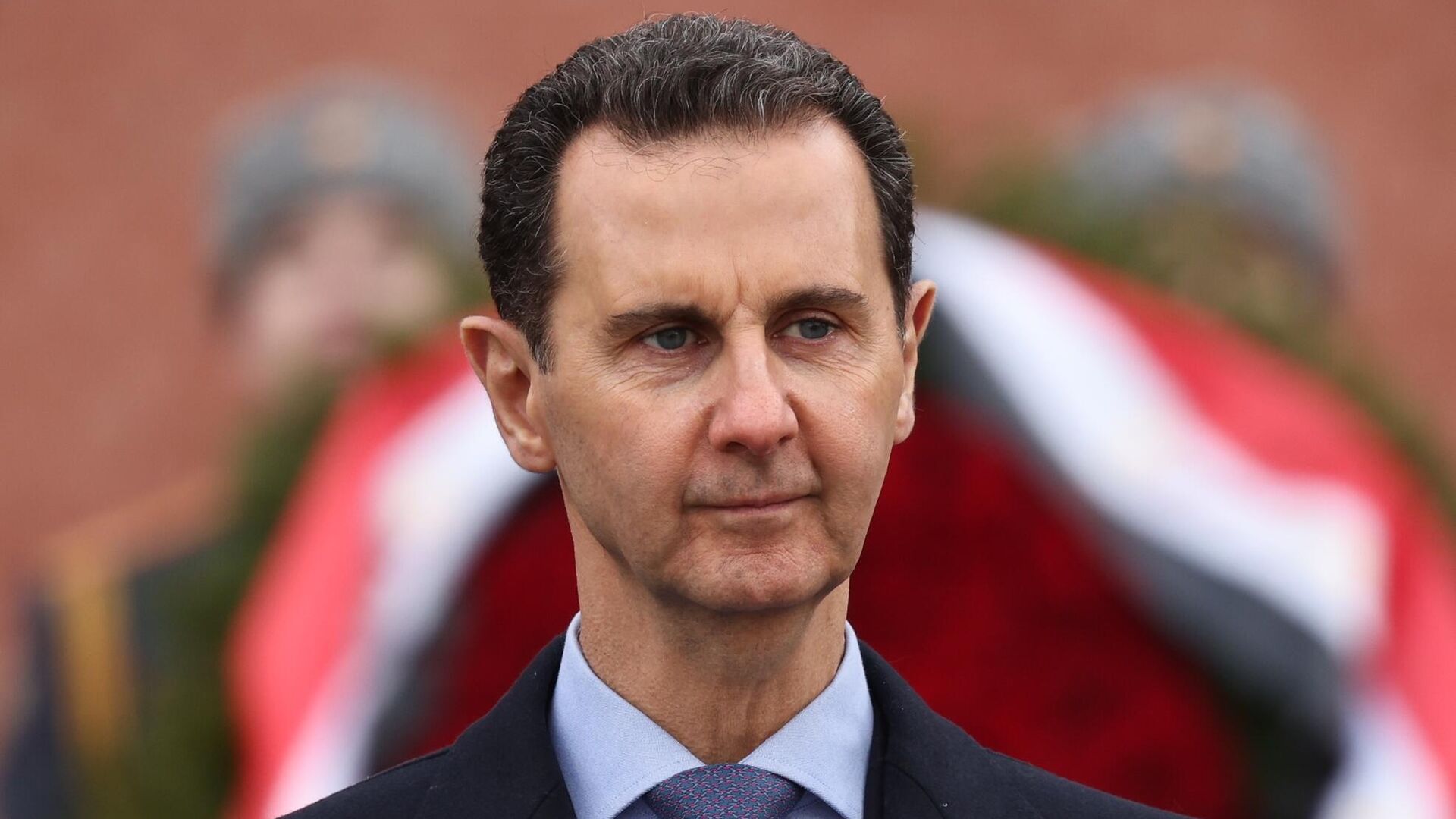https://sputniknews.in/20241211/assads-downfall-and-its-implications-for-pakistan-8532030.html
Assad's Downfall and Its Implications For Pakistan
Assad's Downfall and Its Implications For Pakistan
Sputnik India
Bashar al-Assad's 24-year rule in Syria ended last week as rebel forces seized control of Damascus, shifting regional and global dynamics. Sputnik India... 11.12.2024, Sputnik India
2024-12-11T17:35+0530
2024-12-11T17:35+0530
2024-12-11T19:00+0530
sputnik opinion
syria
syrian civil war
bashar assad
pakistan
al-qaeda
india
taliban
afghanistan
islamabad
https://cdn1.img.sputniknews.in/img/07e8/0c/08/8516677_0:200:1971:1309_1920x0_80_0_0_7e7ca42a4fdaf4941e6f20219768746b.jpg
The fall of Bashar al-Assad's regime could boost Pakistan's geopolitical influence in the Middle East, with its longtime ally Turkiye supporting its efforts in Syria, thanks to Turkiye's significant influence in the country.The rebel factions now in power in Syria have ties with Turkiye, which could positively influence Pakistan-Syria relations given Pakistan's strong rapport with Ankara, according to Minhas Majeed Khan Marwat, an Associate Professor at the Department of International Relations at the University of Peshawar.The academic highlighted that despite Syria's internal conflict, Pakistan maintained neutrality and emphasised humanitarian aid, which preserved goodwill.This enduring relationship, built on military training and counterterrorism expertise, provides a solid foundation for future collaboration. As Syria transitions politically, she reckoned Pakistan's military ties could prove instrumental in maintaining influence and fostering regional stability.Yet, the fall of the Assad regime introduces uncertainty to Pakistan-Syria business ties, the geopolitical analyst believes.Previously, Pakistan's investments in education and humanitarian aid operated within a centralised structure. The emergence of multiple rebel factions could complicate these relationships, requiring renegotiation and recalibration of agreements, Marwat noted.Meanwhile, Pakistan needs to follow a cautious approach in its dealings with the new power centers in Syria, Syed Khalid Muhammad, the Executive Director of CommandEleven, a Pakistani national security and foreign affairs think tank, suggested.Pakistan has a long relationship with the Syrian people with education, doctors, and humanitarian aid being sent regularly, aside from commercial investments, but what happens next in the relationship depends heavily on the interim government that would be formed by Hayat Tahrir al-Sham (HTS), Khalid Muhammad stressed in a conversation with Sputnik India.Since the rebel takeover, the reports emerging from Syria have been very concerning for the Muslim world: there is in-fighting among the factions, Islamic State* and Al-Qaeda* prisoners are being released, while Israel has seized around 400 sq km in the Golan Heights, he revealed.If HTS is able to bring a government to power, and schedule elections, Pakistan will be able to assess its position with more clarity, but in the current framework, every nation in the world is wondering what is going to happen next, making discussions about diplomatic, humanitarian and commercial relationships secondary, until Syria is able to develop some stability on ground, Khalid Muhammad expressed.Pakistan has already been through this exercise when the Taliban** took control of Kabul. Islamabad was quick to provide humanitarian aid, as both a neighbour and brother nation, but when the Taliban was unable to stop terrorism from their soil against Pakistan, the government was forced to take stricter measures. Hence, that experience will be referenced while deciding on the next moves with Syria, he assessed.This is also highly dependent on what happens with the Islamic State and al-Qaeda factions, who have already started executing regime soldiers in Syria, even after Abu Mohammad al-Jolani announced an amnesty, as well as Christians and Kurds who refuse to convert to Islam. What we are seeing is a repeat of what happened in Afghanistan after the US withdrawal in a significantly more hostile region, the analyst remarked.While Pakistan and Syria have had cordial relations, their ties cannot be compared to its connections with Saudi Arabia or the Gulf countries, Dr Tughral Yamin, a retired Brigadier, observed in an interview with Sputnik India.The common Pakistani interest in Syria has been limited to religious tourism and travel to this country has been restricted due to the thirteen years of civil war, the Pakistan Army veteran observed.* Terrorist organisations banned in Russia, India and other countries** Under UN sanctions
https://sputniknews.in/20241210/how-assads-exodus-from-syria-could-impact-india-8522121.html
syria
pakistan
india
afghanistan
islamabad
middle east
turkiye
Sputnik India
feedback.hindi@sputniknews.com
+74956456601
MIA „Rossiya Segodnya“
2024
Pawan Atri
https://cdn1.img.sputniknews.in/img/07e6/0c/13/139630_147:0:831:684_100x100_80_0_0_8fa2b25903e7787fe6a2698552c167df.png
Pawan Atri
https://cdn1.img.sputniknews.in/img/07e6/0c/13/139630_147:0:831:684_100x100_80_0_0_8fa2b25903e7787fe6a2698552c167df.png
News
en_IN
Sputnik India
feedback.hindi@sputniknews.com
+74956456601
MIA „Rossiya Segodnya“
Sputnik India
feedback.hindi@sputniknews.com
+74956456601
MIA „Rossiya Segodnya“
Pawan Atri
https://cdn1.img.sputniknews.in/img/07e6/0c/13/139630_147:0:831:684_100x100_80_0_0_8fa2b25903e7787fe6a2698552c167df.png
syria, syrian civil war, bashar assad, pakistan, al-qaeda, india, taliban, afghanistan, islamabad, middle east, middle east crisis, civil war, civil unrest, turkiye
syria, syrian civil war, bashar assad, pakistan, al-qaeda, india, taliban, afghanistan, islamabad, middle east, middle east crisis, civil war, civil unrest, turkiye
Assad's Downfall and Its Implications For Pakistan
17:35 11.12.2024 (Updated: 19:00 11.12.2024) Bashar al-Assad's 24-year rule in Syria ended last week as rebel forces seized control of Damascus, shifting regional and global dynamics. Sputnik India analyses the implications for Pakistan.
The fall of Bashar al-Assad's regime could boost Pakistan's geopolitical influence in the Middle East, with its longtime ally Turkiye supporting its efforts in Syria, thanks to Turkiye's significant influence in the country.
The
rebel factions now in power in Syria have ties with Turkiye, which could positively influence Pakistan-Syria relations given Pakistan's strong rapport with Ankara, according to
Minhas Majeed Khan Marwat, an Associate Professor at the Department of International Relations at the
University of Peshawar."This alignment may help Pakistan forge better ties with the new Syrian leadership, especially if it positions itself as a mediator or a contributor to Syria's reconstruction. Conversely, this dynamic may be a challenge to India-Syria relations, as India had a longstanding partnership with Assad's regime. Turkiye's influence in Syria and its strained ties with India could sideline New Delhi in the region. Pakistan, by contrast, could enhance its geopolitical leverage by aligning its policies with Turkiye and engaging proactively in Syria's rebuilding efforts," Marwat told Sputnik India.
The academic highlighted that despite Syria's internal conflict, Pakistan maintained neutrality and emphasised humanitarian aid, which preserved goodwill.
This enduring relationship, built on military training and counterterrorism expertise, provides a solid foundation for future collaboration. As Syria transitions politically, she reckoned Pakistan's military ties could prove instrumental in maintaining
influence and fostering regional stability.
Yet, the fall of the Assad regime introduces uncertainty to Pakistan-Syria business ties, the geopolitical analyst believes.
Previously, Pakistan's investments in education and humanitarian aid operated within a centralised structure. The emergence of multiple rebel factions could complicate these relationships, requiring renegotiation and recalibration of agreements, Marwat noted.
"However, the rebuilding phase in Syria presents an opportunity for Pakistan to expand its role in reconstruction efforts. By leveraging its expertise in education and infrastructure, Pakistan could strengthen its economic footprint, provided it establishes ties with the new governing authorities. A challenge will be navigating the fragmented political landscape while ensuring continuity in its aid-driven initiatives," the professor stated.
Meanwhile, Pakistan needs to follow a cautious approach in its dealings with the new power centers in Syria, Syed Khalid Muhammad, the Executive Director of CommandEleven, a Pakistani national security and foreign affairs think tank, suggested.
Pakistan has a long relationship with the Syrian people with education, doctors, and humanitarian aid being sent regularly, aside from commercial investments, but what happens next in the relationship depends heavily on the interim government that would be formed by Hayat Tahrir al-Sham (HTS), Khalid Muhammad stressed in a conversation with Sputnik India.
Since the rebel takeover, the reports emerging from Syria have been
very concerning for the Muslim world: there is in-fighting among the factions,
Islamic State* and Al-Qaeda* prisoners are being released, while Israel has seized around 400 sq km in the Golan Heights, he revealed.
"Israel has carried out over 300 airstrikes decimating Syrian military infrastructure and equipment, while the US has also carried out over 100 bombing missions on Islamic State targets in Syria. There seems to be a fear that the Islamic State or al-Qaeda may use Syria as a foothold, making things unclear enough for any nation to start a discussion on relationships with the new administration yet," the think tanker said in an interview with Sputnik India.
If HTS is able to bring a government to power, and schedule elections, Pakistan will be able to assess its position with more clarity, but in the current framework, every nation in the world is wondering what is going to happen next, making discussions about diplomatic, humanitarian and commercial relationships secondary, until Syria is able to develop some stability on ground, Khalid Muhammad expressed.
Pakistan has already been through this exercise when the Taliban** took control of Kabul. Islamabad was quick to provide humanitarian aid, as both a neighbour and brother nation, but when the Taliban was unable to stop terrorism from their soil against Pakistan, the government was forced to take stricter measures. Hence, that experience
will be referenced while deciding on the next moves with Syria, he assessed.
This is also highly dependent on what happens with the Islamic State and al-Qaeda factions, who have already started executing regime soldiers in Syria, even after Abu Mohammad al-Jolani announced an amnesty, as well as Christians and Kurds who refuse to convert to Islam. What we are seeing is a repeat of what happened in Afghanistan after the US withdrawal in a significantly more hostile region, the analyst remarked.
While Pakistan and Syria have had cordial relations, their ties cannot be compared to its connections with Saudi Arabia or the Gulf countries, Dr Tughral Yamin, a retired Brigadier, observed in an interview with Sputnik India.
The common Pakistani interest in Syria has been limited to religious tourism and travel to this country has been restricted due to the thirteen years of civil war, the Pakistan Army veteran observed.
"Bashar al-Assad was not popular in Pakistan because he represented a fringe religious group. Despite that, the changes in Syria have happened at a very fast speed and Pakistan has yet to take any official position. In my opinion, it will let the dust settle before engaging with the new rulers," Yamin concluded.
* Terrorist organisations banned in Russia, India and other countries



